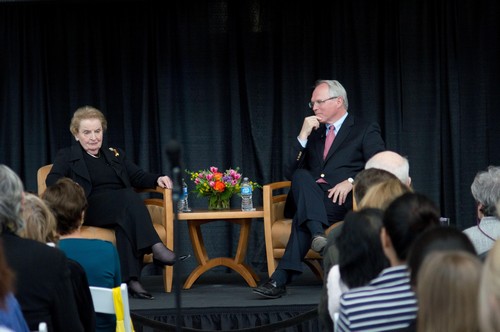 Photo by: Ryan Lumpkin
Photo by: Ryan Lumpkin
North Korea manipulates international attention by actions that cause worldwide concerns,B said former Secretary of the State Madeleine Albright at a speech last Friday in the Cable Center.
Albright, a Denver native, served as the 64th at Secretary of State from January 1997 to January 2001. Albright visited North Korea in 2001..
During her lecture, which was attended by more than 620 students, staff, faculty and others, she addressed North Korea’s failed rocket launch on Friday and the effects it will have on diplomacy.
“My sense is that [the North Korean leaders] are the most stubborn people I have ever met, which adds to their isolation,” said Albright. “This creates a disconnect. They don’t know how to negotiate. They want to scare people and solidify their power.”
Christopher Hill, dean of the Josef Korbel School of International Studies and former U.S. ambassador, said Albright tried to strengthen the relationship between the U.S. and North Korea.
Albright served as the liaison between North Korea’s military dictator Kim Jong-il and the U.S. President at the time, Bill Clinton. Albright said she believed the U.S. had little intelligence on North Korea and that the majority of people thought Kim Jong-il was crazy.
“He’s not crazy,” said Albright, and the crowd laughed. “I went over there without any idea what to do. I was told I had to see Kim Jong-il’s father and after a number of things I finally saw him. We were the same height. I was wearing high heels, though.”
Ultimately, Albright said North Korea’s use of weapons is a form of power, which Kim Jong-il used to get the attention of the U.S.
During her time as Secretary of State, Albright said she spent a lot of time trying to ensure the ethnic cleansing in Serbia stopped. The ethnic cleansing first occurred from 1992-1995 during the Bosnian War and was instigated by the Bosnian Serbs against the Muslims and Croats. Another form of ethnic cleansing occurred in 1999 during the Kosovo War, and it was against the Serbs and the Albanians.
“I think Americans have a tendency to make lists and check things off and say they are done,” said Albright. “That was the case for the Balkans. For me, the lesson is we can’t just decide something is over and that the issue will be resolved when we snap our fingers.”
Hill said Albright pioneered her job as Secretary of State by reaching out amongst the political ministries.
Hill emphasized how she became a public figure and a positive image for the U.S. because she was so approachable.
“Politics is limited,” said Albright. “As Secretary of State I started No-Fault dinners in the State Department because I didn’t want the questions I asked to be quoted. I enjoyed getting input from people who had done more thinking about a subject.”
Albright grew up in Denver and said she felt at home being back in town for this event. Her father, Josef Korbel, was the founding dean of the Josef Korbel School of International Studies as well as a Czechoslovakian diplomat.
According to Albright, being the daughter of a diplomat and a professor gave her a lot of knowledge on diplomacy.
She currently works as a professor at Georgetown University’s Walsh School of Foreign Service.
She said the relationship that politics and academics have together is crucial because they rely on each other to succeed.
“I am an advocate of connecting the tools between diplomacy and education,” said Albright.











